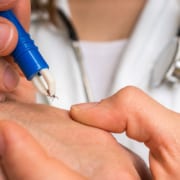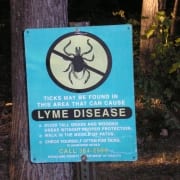Lyme Disease – Four Reasons It May Go Undetected
If left undiagnosed and untreated, Lyme disease and other tickborne illnesses can have detrimental long-term effects on the body.
Lyme disease is the most reported vector-borne illness (diseases transmitted through mosquitoes, tick, and flea bites) in the United States. The latest numbers from the CDC estimate that approximately 476,000 patients are diagnosed and treated for Lyme each year.* People who are diagnosed early and receive proper treatment consisting of 28-30 day antibiotic therapy usually recover rapidly and completely. However, others who are correctly diagnosed and treated sometimes fail to fully recover, and, for a variety of reasons, still others go undiagnosed and untreated.
This article explores 4 reasons why Lyme disease may go undetected and/or become a chronic illness.
1) It is not always possible to confirm a tick bite

A key component of early diagnosis is recognition of the characteristic “bulls-eye” rash. Courtesy of the CDC/PHIL.
The only way you can contract Lyme disease is through the bite of an infected tick. If you develop the telltale bull’s eye rash (medically referred to as erythema migrans), there is no disputing the fact that you have Lyme disease, but not all patients have a rash and sometimes the rash does not have a bull’s eye appearance.
Ticks vary from the size of a poppy seed to a sesame seed, which makes them hard to see; and they prefer latching onto hard-to-see areas of the body such as armpits, groin, or scalp, so it’s likely you won’t notice their presence. This means, more often than not, you won’t know if you’ve been bitten, and by the time you start feeling sick – the incubation period for Lyme ranges from a few days to a few weeks – the tick will be long gone.
2) Lyme disease symptoms are very similar to other non-tickborne chronic illnesses.
Another factor that can make it difficult to obtain an accurate diagnosis is the similarity of symptoms that present with Lyme and other tickborne diseases (fever, chills, fatigue, headache, and joint aches) with those of many other non-tickborne illnesses, such as flu and other viral or bacterial infections.
If left undiagnosed and untreated, there can be detrimental effects on the body’s musculoskeletal and nervous systems. Symptoms such as chronic joint pain & headaches, extreme fatigue, and mood disorders can subsequently be misdiagnosed as fibromyalgia, chronic fatigue syndrome, or depression. This similarity of symptoms can cause delays in getting tested, and in turn causing delays in treatment.
There is also evidence indicating that chronic cases of Lyme disease (when symptoms persist after taking the typical short-term dose of antibiotics – also called Post Treatment Lyme Disease) contribute to a sustained inflammatory condition throughout the body that interferes with the healthy functioning of the nervous system. Known as Central Sensitization Syndrome, CSS has been implicated in several chronic illnesses and pain conditions, including fibromyalgia, chronic fatigue syndrome, depression, and Lyme disease.
Questions? Give Us a Call!
3) The patient may also be co-infected with another tickborne disease.
Ticks can carry multiple bacteria and parasites, including Babesiosis, Ehrlichiosis, Anaplasmosis, Bartonella, and Rocky Mountain Spotted Fever (also called Spotted Fever Rickettsiosis), and it’s not uncommon to see patients with multiple tickborne infections, but you won’t find them if you don’t look. In fact, some studies suggest that as much as 30 percent of ticks that carry Lyme also carry another infectious agent that produces similar symptoms to those of Lyme disease, but requires completely different antibiotics and lengths of treatment. Because of this, it is extremely important for physicians to test for all forms of tickborne diseases and not just for Lyme.
4) Laboratory tests, while important, have room for improvement
Unless you’re among the small percentage of people who present the classic bulls-eye rash, a confirmed diagnosis is a little trickier. Blood tests, can get you another step closer to a diagnosis – and more importantly – a treatment. But before deciding to run diagnostic testing, a doctor must consider a patient’s physical symptoms and obtain a comprehensive history that assesses their personal exposure risk. For example, if an individual is experiencing some suspicious symptoms and often hikes or horseback rides, and/or owns a pet that spends time outdoors, a Lyme test is in order.
Unfortunately, the tests aren’t perfectly reliable, especially if the order includes testing for Lyme and other tickborne diseases. Different labs have varying levels of sensitivity, and some testing can miss some cases of infection. To accurately interpret test results your physician needs to understand the sensitivity and specificity – or, in other words, the limitations — of the lab testing they are ordering.
So what’s the takeaway?
Be your own healthcare advocate. The best medicine is prevention. Before recreating outdoors, cover your body in light-colored clothing. Use an insect repellant on yourself and make sure to treat your pet. Take the time to check yourself and your pet for ticks after spending time outdoors. If you do find a tick, do not throw it away. It can be sent to a lab, such as tickreport.com, and tested for multiple tickborne diseases. Having this information will allow you to request the proper treatment faster.
If you do notice Lyme-like symptoms, a helpful first step is the Horowitz Lyme Questionnaire. Developed by Lyme expert, Dr. Richard Horowitz, this test should not replace medical advice from your physician but can be a useful tool to determine the likelihood of Lyme or other tickborne illnesses. The only way to confirm or rule out a Lyme diagnosis is with a blood test.
Every individual is unique in their genetic makeup, medical history, and environmental exposures. Each of these factors can affect how Lyme disease manifests itself in your body. If some of your symptoms persist, even after you have been treated — don’t give up! Be your own advocate; keep asking questions and seeking answers until you find the right treatment options for you.
Looking for natural ways to protect yourself?
This Washington Post article outlines several non-toxic, protective measures against tick and mosquito bites that are also less harmful to the environment: Nontoxic methods to protect yourself against mosquitos and ticks.
—
*This number includes both actual infections and patients that are treated presumptively but may not actually be infected.
We are here for you, and we want to help.
Our goal is to return you to optimal health as soon as possible. To schedule an appointment please call: 703-532-4892 x2
This article was originally published in July 2017. It was reviewed and updated on May 2023.









Leave a Reply
Want to join the discussion?Feel free to contribute!